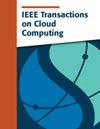A Cross-Workload Power Prediction Method Based on Transfer Gaussian Process Regression in Cloud Data Centers
IF 5
2区 计算机科学
Q1 COMPUTER SCIENCE, INFORMATION SYSTEMS
引用次数: 0
Abstract
Nowadays, machine learning (ML)-based power prediction models for servers have shown remarkable performance, leveraging large volumes of labeled data for training. However, collecting extensive labeled power data from servers in cloud data centers incurs substantial costs. Additionally, varying resource demands across different workloads (e.g., CPU-intensive, memory-intensive, and I/O-intensive) lead to significant differences in power consumption behaviors, known as domain shift. Consequently, power data collected from one type of workload cannot effectively train power prediction models for other workloads, limiting the exploration of the collected power data. To tackle these challenges, we propose基于传递高斯过程回归的云数据中心跨工作负载功率预测方法
如今,基于机器学习(ML)的服务器功率预测模型已经显示出卓越的性能,利用大量标记数据进行训练。然而,从云数据中心的服务器收集大量标记电源数据会产生大量成本。此外,跨不同工作负载(例如,cpu密集型、内存密集型和I/ o密集型)的不同资源需求会导致功耗行为的显著差异,称为域转移。因此,从一种工作负载中收集的功率数据不能有效地训练用于其他工作负载的功率预测模型,从而限制了对所收集的功率数据的探索。为了解决这些问题,我们提出了一种基于多源传递高斯过程回归的跨工作负载功率预测方法TGCP。TGCP将知识从跨多个源工作负载的丰富电力数据传输到具有有限电力数据的目标工作负载。此外,连续归一化流调整高斯过程的后验预测分布,使其局部非高斯分布,增强了TGCP处理实际功率数据分布的能力。该方法提高了对目标工作负载的预测精度,同时减少了获取真实云数据中心电力数据的费用。在实际功耗数据集上的实验结果表明,TGCP在跨工作负载功耗预测方面优于4种传统ML方法和3种迁移学习方法。
本文章由计算机程序翻译,如有差异,请以英文原文为准。
求助全文
约1分钟内获得全文
求助全文
来源期刊

IEEE Transactions on Cloud Computing
Computer Science-Software
CiteScore
9.40
自引率
6.20%
发文量
167
期刊介绍:
The IEEE Transactions on Cloud Computing (TCC) is dedicated to the multidisciplinary field of cloud computing. It is committed to the publication of articles that present innovative research ideas, application results, and case studies in cloud computing, focusing on key technical issues related to theory, algorithms, systems, applications, and performance.
 求助内容:
求助内容: 应助结果提醒方式:
应助结果提醒方式:


